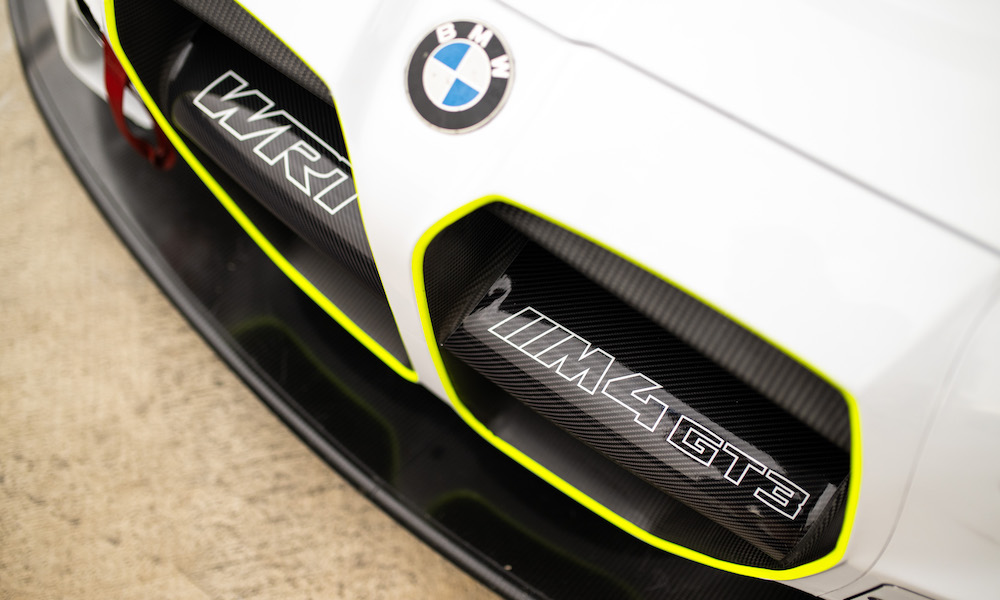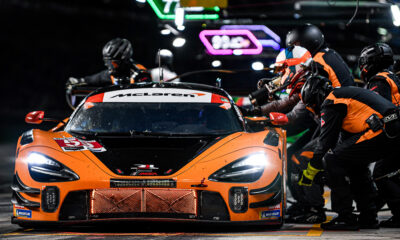
Photo: Marius Hecker/DPPI
BMW is proceeding “according to plan” with the development of its Evo kit for the M4 GT3, with homologation set to take place in the second half of the year ahead of its customer rollout and a 2025 race debut.
As previously reported by Sportscar365, the German manufacturer is working to introduce an updated version of its GT3 challenger to customers next year, which comes after three years of the car’s original lifecycle has been completed.
The updated car first broke cover with partial camouflage at a test at Circuit de Spa-Francorchamps last year, with development being carried out by BMW M Team RMG.
BMW M Motorsport director Andreas Roos told Sportscar365 that the German manufacturer is on schedule with the car’s development.
Roos added that it is “definitely the goal” for the new car to be present at the sanctioned end-of-year IMSA WeatherTech SportsCar Championship test at Daytona International Speedway that traditionally takes place in December.
“We still have some tests going on with the car, but everything is according to plan, so at the moment [it] looks good,” he said.
“It’s definitely the plan to get the first cars out at the end of the year and that everybody can prepare best for the 2025 season with the new car. And we also have to have the update packages for the existing car, [so] that they can be converted to Evo.
“This is why we were also very early with the development because at the end you have to get everything ready for all the cars which are out there plus the new cars.”
Roos revealed that BMW had initially targeted to complete the homologation process for the updated car in the opening months of this year.
“We actually wanted to homologate the car I think already before, at the beginning of this year but we didn’t get a date and couldn’t find a time slot together with FIA,” he explained.
“So it will for sure be directly in the second half of the year. Then the car will be homologated and we have to bring the cars out [so] that the teams can run with it.”
Roos reiterated that lap time gains are not a target for BMW in the development process for its Evo package, but that the greater focus is on driveability improvements as well as seeking a larger performance window across a range of circuits.
“There are still some things what you can improve and where you can make the car easier to handle for drivers and also mechanics team to run the car,” he said.
“This is a big part where we worked on and just to improve this even more, but also things like drivability too.
“The wider window of the car that it not only works on two or three specific tracks, that it really works on a lot.
“I think we did a step there with the M6 to the M4 and now we hope to do the next step with the M4 GT3 Evo to be even, let’s say, wider from the window.
“Because there’s also secret still that on very narrow and tiny tracks with the concept of the car we still struggle sometimes. The cars with a shorter wheelbase and more compact cars are a bit [better].
“For sure we can’t change the size of our car but but still you can get work on some topics on, how you set up the car and which possibilities you have to improve.
“This is what is the main focus to work on the car, but then also a big topic is bringing running costs down, increasing drivability, improving the handling of the car and everything. These are the main topics where you work on”
Roos: Brake Issues “No Specific Topic” for BMW
Roos also said that BMW is not focusing on addressing brake issues with the M4 GT3, which most notably cost Paul Miller Racing a potential shot at class victory in the Rolex 24 at Daytona.
“We from [the] BMW side, we know we had a problem in Daytona at Paul Miller Racing, but this has nothing specifically to do with the car itself,” Roos said.
“Because the car proved already to be able to run and also win endurance races, like for example the 24-hour race at Spa.
“We don’t have a specific issue or problem there. I think the problem is understood what happened in Daytona.
“For sure, we always try to improve the car, but there is no specific topic on the brakes that we have to solve, because as I said, the car proved already to be able to run 24-hour races.”
Roos instead indicated that issues suffered by teams could be the result of its own choices, as opposed to a core design problem. He pointed out that each team, for example, is free to select their own brake pad suppliers.
“Sometimes you have the problem that you get pickup or something into the brake ducts and then brakes overheat,” he said.
“And at the end, it’s also a customer racing thing. We give recommendations about brake material and brake pads and everything, but at the end, what the team is running is up to them.”























